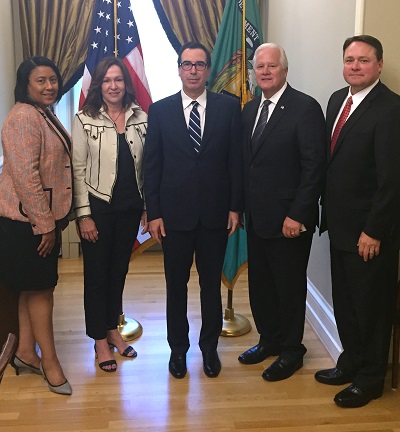Recent Activity

Congress passed the Tax Cuts and Jobs Act (TCJA) on December 20, 2017, and President Trump officially signed it into law on December 22. Thanks to NAFCU's persistent advocacy, this monumental piece of legislation keeps the credit union tax exemption fully intact. This is a testament to the value and strength of credit unions. You can download NAFCU's full analysis of the TCJA to learn more about how this legislation affects credit unions.
Since TCJA’s passage, there have been several high-profile attacks on the credit union tax exemption. Former Senator Orrin Hatch (R-Utah) sent letters to the National Credit Union Administration (NCUA) questioning the need for a tax exemption and to the Internal Revenue Service (IRS) arguing that credit unions should file additional tax forms. Several trade associations representing bankers have also joined in the offensive. NAFCU has actively countered these attacks through conversations with the NCUA, IRS, and Senator Hatch’s personal office, as well as through advocacy letters and op-eds.
- In advance of the House Committee on Ways and Means hearing on the corporate income tax in February 2020, NAFCU reminded the Committee of the exemption’s economic benefit and value to consumers.
- In response to banker attacks, NAFCU President and CEO Dan Berger published an op-ed in American Banker to set the record straight on credit unions’ tax exempt status.
- In June 2019, NAFCU wrote to the House Financial Services Committee and Senate Banking Committee in response to attacks from bankers challenging the credit union tax exemption.
- In April 2018, NAFCU wrote to the IRS explaining that credit unions should not have to file Form 990 as the NCUA provides strong and adequate oversight, including over the areas covered by Form 990.
- NAFCU and the Credit Union National Association (CUNA) sent a joint letter to Senator Hatch on February 21, 2018 defending credit unions and their mission.
- On January 31, 2018, NAFCU sent a letter to Senator Hatch defending credit unions’ federal tax exemption and the benefits it provides to the economy.
Of note, Senator Hatch retired at the end of 2018, and no other member of Congress joined in his public attacks on the credit union tax exemption. Furthermore, in the “Tax Reform 2.0” framework released by the House Ways and Means Committee in July 2018, there was no threat to the credit union tax exemption, and there has been no threat to the exemption this Congress thus far. Credit unions have many champions in Congress, and it is unlikely that they will consider changing the tax exemption at this point. Nonetheless, NAFCU remains vigilant and focused on fighting any threats to the credit union tax exemption.
Excise Tax
As for the 21 percent excise tax on excess executive compensation, which was implemented under the TCJA, NAFCU continues to advocate for a legislative fix to ensure parity between for-profit and not-for-profit corporations. NAFCU has urged Congress to provide a technical fix to "grandfather" those employment contracts entered into on or before November 2, 2017, for tax-exempt employers. The TCJA contained a provision allowing for-profits to grandfather in binding contracts in effect before that date but did not include the same clause for not-for-profit tax-exempt organizations. Of note, the fiscal year 2020 spending bills that passed Congress in December 2019 (and were signed into law by President Trump) provided a NAFCU-sought fix to repeal the excise tax imposed on certain fringe benefits (such as parking) offered by not-for-profits. Grandfathering of the excise tax on certain executive compensation was not addressed.
At the end of 2018, the U.S. Department of the Treasury (Treasury) and the IRS issued Interim Guidance Under Section 4960 to explain how the excise tax should be reported and paid in the absence of implementing regulations. Treasury and the IRS note that credit unions should use Form 4720, Return of Certain Excise Taxes Under Chapter 41 and 42 of the Internal Revenue Code. To learn more about the Interim Guidance, please read NAFCU’s Compliance Blog post and Final Regulation.
